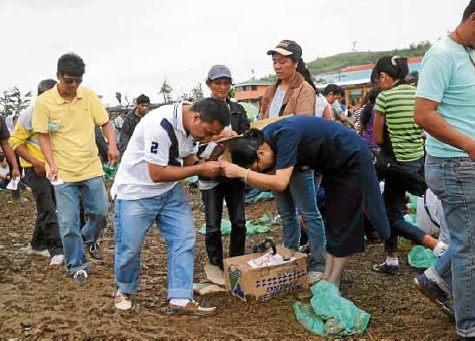Compassion, relief and anonymity behind Tzu Chi Foundation’s charity work
No good deed goes unnoticed.
And so, despite the low profile that Tzu Chi Foundation Philippines has cultivated in the past 22 years as it quietly goes about its humanitarian work, the organization was recently conferred the Parangal Lingkod Sambayanan (Community Service Award) by Ateneo de Manila University (ADMU).
Tzu Chi Foundation (which literally means “compassion and relief”) was cited for its longstanding extraordinary work in providing relief to those in need as well as its commitment to uplift the lives of the poor in calamity-stricken areas.
The recognition is one of ADMU’s annual Traditional University Awards, which honor individuals and organizations that best embody its values.
“Tzu Chi Foundation Philippines’ work in alleviating the suffering of the poor, especially disaster victims, has truly been extraordinary, not only in terms of scale but also in the swift and effective way in which it is carried out,” read the award citation.
Relief missions
ADMU also cited the foundation’s “joy, peace, kindness and compassion” in carrying out its work which, it said, has inspired a spiritual transformation among its volunteers and beneficiaries.
The award explicitly highlighted Tzu Chi’s relief missions in Leyte, particularly in Tacloban in the wake of Supertyphoon “Yolanda” (international name: Haiyan) that killed more than 6,000 people and left hundreds of thousands of families homeless. It noted that Tzu Chi volunteers were among the first to arrive in the province—a week after the typhoon struck on Nov. 8, 2013.
In Tacloban, the foundation immediately launched a 19-day cash-for-work program that allowed typhoon survivors who participated in the cleanup of their respective communities to earn P500 for a day’s work. It also brought in 54 units of heavy equipment that hauled tons of debris out of the city.
“The victims’ immediate needs were attended to with great speed and efficiency,” the citation read. In a span of a few months, its volunteers served hot meals to over 280,000 survivors and distributed 68,000 blankets.
To facilitate the rehabilitation process, the foundation also granted 300,000 survivors a financial aid of P8,000 for a family of three, and P15,000 for a family of five.
Fiberglass classrooms
It also set up free clinics in various areas in Leyte and flew in volunteer medical experts from Tzu Chi International Medical Association from eight countries, who took turns providing free consultation and treatment to more than 8,300 patients.
To address the housing and education needs of survivors in various towns of Leyte, the foundation set up prefabricated fiberglass classrooms to replace those flattened by Yolanda. It also launched several housing projects for the homeless.
In 2014, 100 houses built in a community called Tzu Chi Great Love Village were turned over to the beneficiaries. In April last year, the foundation finished another housing project on a 50-hectare donated land in Ormoc that allowed the first batch of 150 typhoon-displaced families to move in.
Its humanitarian efforts in Tacloban post-Yolanda may have been the most visible of its charity work, but the foundation has been providing help and relief in many disaster-stricken areas all over the country for decades now, the ADMU citation said.
It organized its first relief work in Mindoro when the province was hit by a 7.1-magnitude earthquake in 1994. The foundation also responded to other high-profile disasters in the country: in Quezon following the flash floods and landslides due to Typhoons “Winnie” and “Yoyong” in 2004; in Metro Manila after Tropical Storm “Ondoy” in 2009, and in Cagayan de Oro after Typhoon “Sendong” in 2011.
Spiritual happiness
Tzu Chi was also in Zamboanga after the 2013 siege, in Bohol after the 2013 earthquake, and in Nueva Ecija last year after Typhoon “Lando.”
The foundation was founded in Taiwan by Dharma Master Cheng Yen in 1966, based on her belief that “to save the world, we must believe in transforming human hearts.” This, she said, may be achieved through humanitarian work, “where one does not only help those in need but also becomes aware of the harsh realities of life, and finds spiritual happiness through giving.”
It began with the motto of “instructing the rich and saving the poor,” as a group of 30 housewives donated a small amount of money each day to care for needy families. According to its website, Tzu Chi volunteers show their gratitude “for the opportunity to practice selfless giving by presenting relief material to survivors with both hands, a deep bow, and a smile or a hug.”
The foundation has since become the world’s biggest Buddhist humanitarian organization with 10 million volunteers working in 52 countries.















